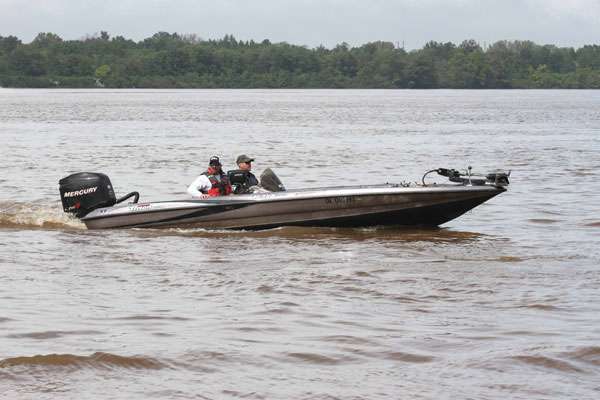
PHILADELPHIA — The Bassmaster Elite at the Delaware River, Aug. 7-10, 2014, promises to be an historic occasion in a couple of particulars. For one, it’s B.A.S.S.’s first stop at this venue, best known for George Washington’s crossing into New Jersey for a surprise attack on British forces. For another, it begins the stretch run of the 2014 Elite season, culminating in dozens of Bassmaster Classic berths and the crowning of the Toyota Bassmaster Angler of the Year.
But the angler with the best insight into the Delaware River’s bass fishery isn’t in the tournament. He’s Pete Gluszek, the Dean of Bass University TV, a two-time B.A.S.S. tournament winner and three-time Classic qualifier. Gluszek lives in nearby Mt. Laurel, N.J., and has spent the last 25 years fishing the river — typically 20 or 25 times a year.
“It’s going to be interesting to see how the best anglers in the business will approach the river,” Gluszek says. “They’ll have fresh eyes, and I can’t wait to find out how it goes!”
Patterns vs. Spots: One of the first questions the pros have to determine in breaking down tournament waters is whether the event will be won by fishing a pattern (with a multitude of locations fitting a productive profile) or a spot (a single area one angler can exploit and protect from the rest of the field).
Gluszek is adamant that this event will be won with a solid pattern … or two or three. “I don’t think there’s a spot on the Delaware that will hold up for four days of fishing,” he says. “Patterns on the river revolve around vegetation (eelgrass and hydrilla) and hard cover (bulkheads, docks and piers, rocks, riprap and laydowns).
“The real key, though, is coming up with the proper strategy for the tides and being in the right places at the right times.”
Baits for Success: “Fishing on the river isn’t fancy,” Gluszek says. “Crankbaits, jigs, shaky heads, spinnerbaits and vibrating jigs are going to catch the bulk of the fish. Tidal water bass want to bite, and power fishing is usually the way to go. The bass battle a lot of current and are looking for feeding opportunities.”
That said, the New Jersey pro believes that the winner will rely on more than one bait type for his catch, changing weapons as the tide changes or as he moves to new and ideally more productive areas.
Decisions, Decisions: “The first thing the Elite pros will have to decide,” Gluszek offers, “is whether they’ll try to develop patterns on the main river or in the creeks
Though the river offers water that’s more than 50 feet deep in places, anything greater than 10 feet is considered “deep” to local anglers, and few tournaments are won by fishing “down there.”
“The deeper you go, the more current you have to deal with,” Gluszek says. “That makes everything a little tougher.”
The Extra Mile(s): Anytime the Elites are on a river, long, gas-burning, bone-jarring, time-consuming runs are a possibility, and that’s certainly true on the Delaware. In fact, it’s especially true so late in the season when many anglers’ hopes of a Classic berth hinge on a win here.
Gluszek knows of a few tributaries with winning potential that are hours from the starting point at Frankford Arsenal Boat Launch.
“You’d have to run an hour and a half or so out to Delaware Bay and then run up a creek or river another 30 or 40 minutes to find quality fresh water, but it could pay off. If the wind’s blowing against the tide in the bay, though, you’re going to have some nasty waves to battle.”
Expect a Slow Start: Because the tournament will open at low tide on Thursday morning, Gluszek believes the fishing will start tough and get better each day.
“With the water low, being in the right place to begin the tournament is critical. If you guess wrong, you’re going to be in for a long day. The first round will be the most challenging. I’m expecting the best catches to come in the finals (Sunday).
To Win: “I’m predicting that 44 pounds, 12 ounces will win the tournament,” Gluszek says. “To make the first cut (Top 50 after two days), it’ll take about 19 or 20 pounds. It’s going to be really tight, with just ounces separating most of the anglers in the Top 12 in the finals.”
Gluszek’s predicted winning weight is only about a pound more than the lightest winning weight in Elite history. He estimates the weight of the tournament’s big bass to be “right around the 6-pound mark.”
And that big fish will be a largemouth — the critical species for tournament anglers at this event. Though smallmouth bass also inhabit the Delaware and its tributaries, Gluszek doesn’t expect them to be much of a factor.
“An angler might target smallmouth to make the first cut,” he says, “but to have a chance to win, you’ll need largemouth.”
Ones to Watch: Gluszek’s close friend, Michael Iaconelli, cut his angling teeth on the Delaware and other area waters and is a resounding pre-tournament favorite among fishing fans, including Gluszek. But Ike’s not the only angler Gluszek will be watching at the tournament.
“Jacob Powroznik is extremely talented and grew up fishing the James River, so he certainly understands tidal waters. I’m also expecting one of the western pros who are strong on the California Delta to do well here.”
Check out Pete Gluszek’s on-the-water blogs during competition on Bassmaster.com.

